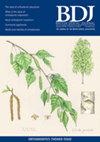The safe practitioner framework: an imperative to incorporate a psychosocial sub-curriculum into dental education
IF 2
4区 医学
Q2 DENTISTRY, ORAL SURGERY & MEDICINE
引用次数: 0
Abstract
A primary aim of dental schools is to produce competent and caring independent professionals, capable of developing themselves and serving the needs of their patients through reflective practice and self-regulated continuous learning. The General Dental Council has also explicitly recognised the importance of self-regulated learning, and other associated behaviours, in the new The safe practitioner framework. However, traditional learning designs focus on the development of academic and clinical skills, and assume that psychosocial skills, which support self-regulated learning and enable the management of personal challenging circumstances, are already present. Unfortunately, data suggest that the psychosocial skills in many students currently entering healthcare programmes are relatively underdeveloped, impacting upon their approaches to learning and their mental health, and potentially, patient safety. Therefore, there is a need to support students in their psychosocial development. This development starts with teachers understanding the societal, academic and environmental circumstances that their current students have experienced, followed by the consideration of the importance of psychosocial skills within their dental education. This paper discusses these matters and suggests a psychosocial sub-curriculum along with a suggested framework for its implementation.

求助全文
约1分钟内获得全文
求助全文
来源期刊

British Dental Journal
医学-牙科与口腔外科
CiteScore
3.10
自引率
15.40%
发文量
1096
审稿时长
4-8 weeks
期刊介绍:
The role of the BDJ is to inform its readers of ideas, opinions, developments and key issues in dentistry - clinical, practical and scientific - stimulating interest, debate and discussion amongst dentists of all disciplines. All papers published in the BDJ are subject to rigorous peer review.
 求助内容:
求助内容: 应助结果提醒方式:
应助结果提醒方式:


